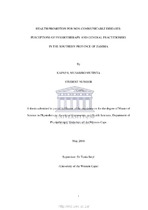| dc.description.abstract | The increasing spread of non-communicable diseases (NCDs), especially in the lowand
middle-income countries calls for a more holistic and cost-effective measure to
reduce its impact on society. One of the methods advocated for achieving this is health
promotion. The Zambian government has called for a shift from curative to preventive
management of diseases, including NCDs. Therefore, health professionals are being
called upon to redirect their health care management approaches towards preventative
care, incorporating health promotion. The study aimed at examining the knowledge,
attitudes, practices and perceptions of physiotherapy practitioners and general medical
practitioners in Zambia regarding their role in health promotion for NCDs in the
hospitals of the Southern Province, Zambia. A sequential explanatory mixed method
approach was employed. The quantitative results revealed 98% knowledge of general
medical practitioners compared to the 90.6% of the physiotherapists. For attitude,
physiotherapists possessed a more positive attitude with 86% while general medical
practitioners possessed 80%. Lastly, the study revealed that physiotherapists practise
health promotion more than the general medical practitioners, with a 96.2% and 67.7%
respectively. The logistic regression showed no significance between the knowledge
and attitude scores of the two groups of health practitioners. However, the practice
scores revealed that physiotherapists are four times more like to incorporate health
promotion compared to the general medical doctors. Both types of health practitioners
were of the view that health promotion is the way forward towards the fight against
NCDs. However, a number of challenges were echoed that prevent the implementation
of a holistic approach management in their practice. Most of the challenges prevalent
in these hospitals are policy-based, hence the need for policy makers to intervene for
the fight against NCDs. | en_US |

